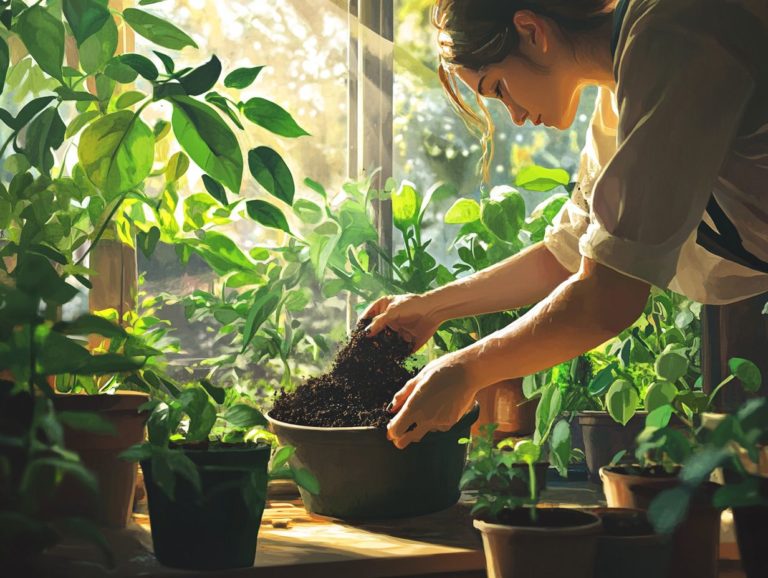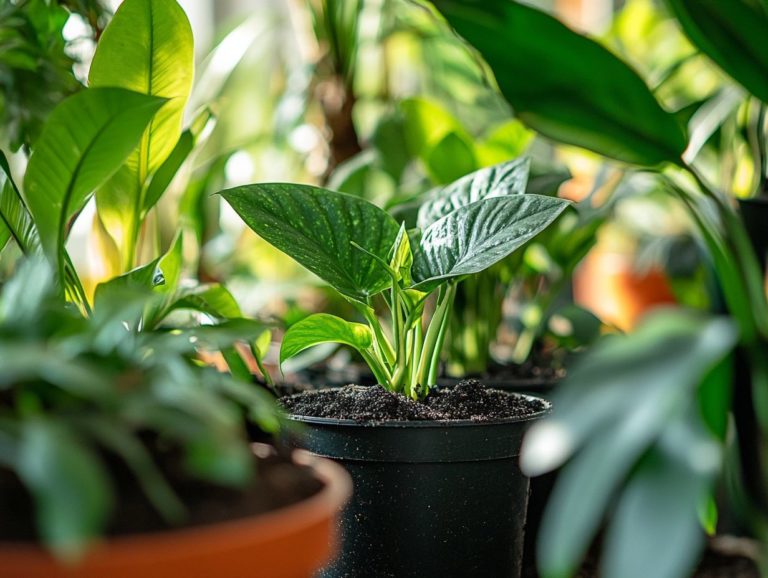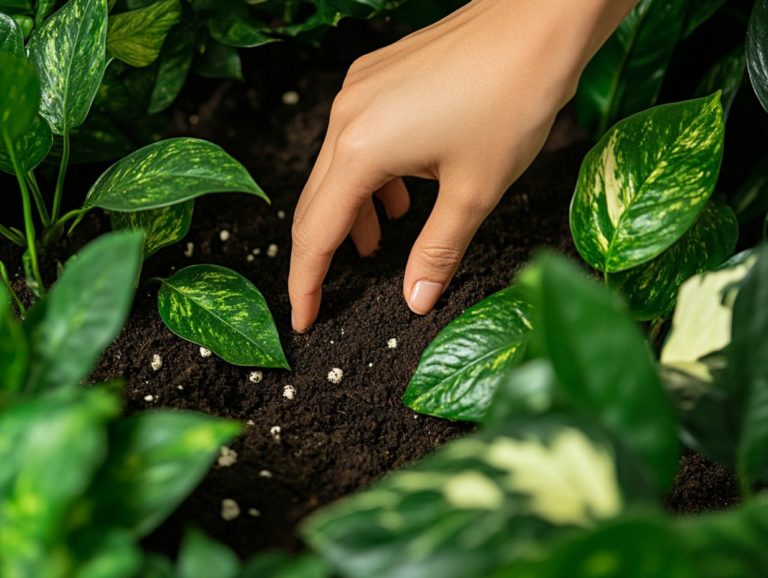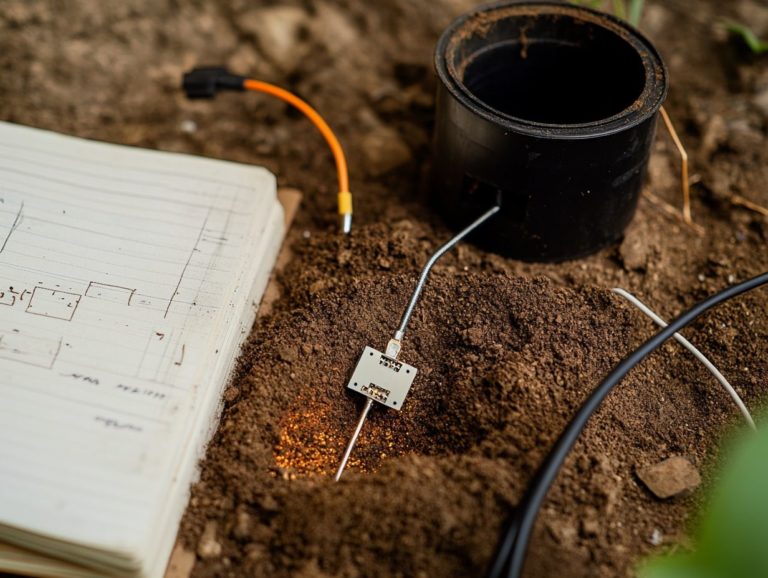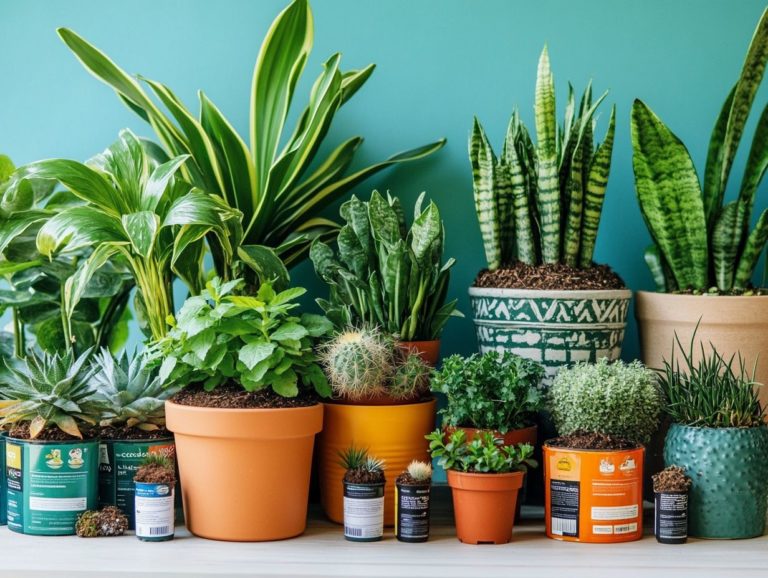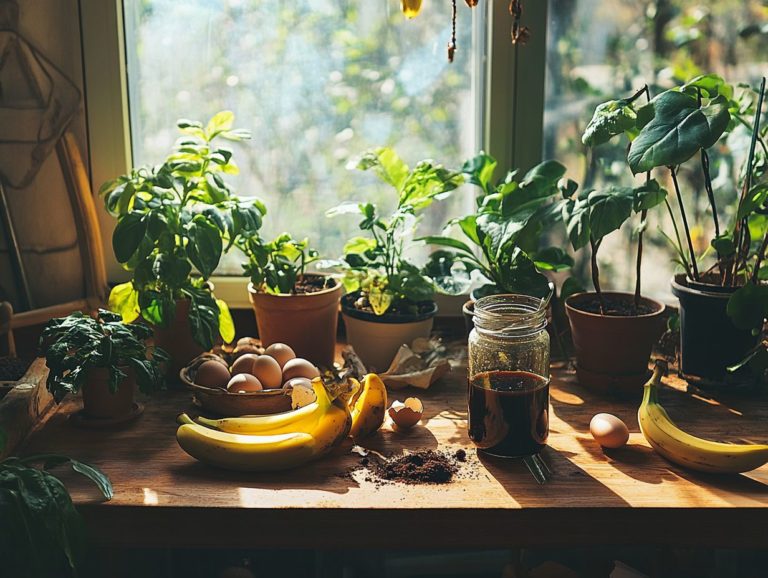How to Amend Soil for Indoor Plant Growth
Healthy soil serves as the bedrock for flourishing indoor plants. However, many plant enthusiasts often underestimate the critical role of soil amendments.
Soil amendments boost nutrient levels. They also improve drainage and enhance plant vitality. This article delves into the realm of soil amendments, exploring the various types available both organic and inorganic and guiding you in selecting the perfect one for your indoor plants.
You’ll discover effective application techniques and essential tips for maintaining soil health, ensuring that your green companions thrive.
Join us on this exciting journey to transform your indoor gardening!
Contents
- Key Takeaways:
- What are Soil Amendments?
- Types of Soil Amendments
- Choosing the Right Amendment for Your Indoor Plants
- Applying Soil Amendments
- Maintaining Soil Health for Optimal Plant Growth
- Frequently Asked Questions
- What is the importance of amending soil for indoor plant growth?
- How do I determine if my indoor plants need soil amendment?
- What types of amendments can I use for indoor plants?
- How often should I amend the soil for my indoor plants?
- Can I use outdoor soil for my indoor plants?
- Is it necessary to amend the soil for all types of indoor plants?
Key Takeaways:
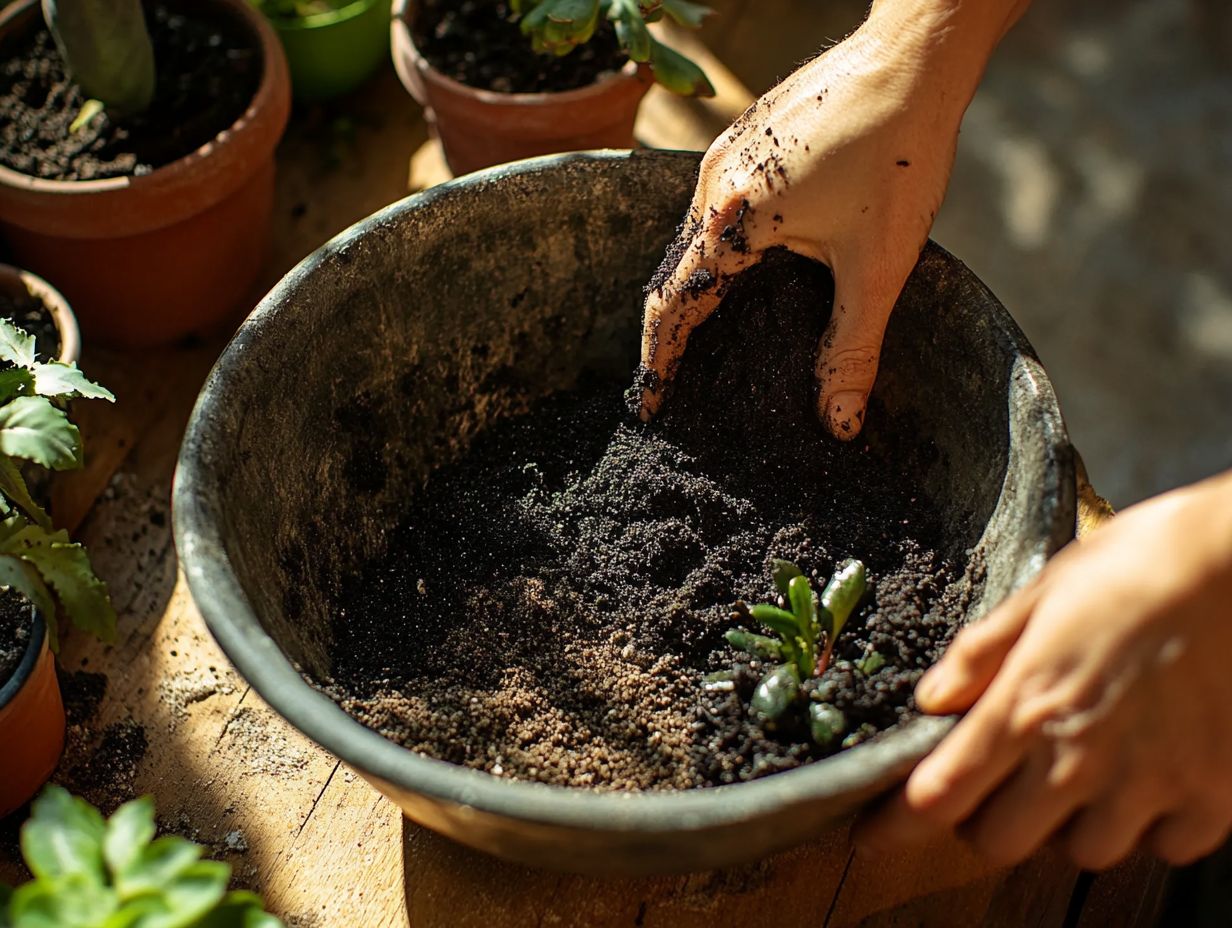
- Regularly testing and reapplying soil amendments is crucial for maintaining soil health and promoting optimal growth for indoor plants.
- When choosing an amendment, consider factors such as plant type, nutrient needs, and soil type to ensure the best results.
- Understanding the different types of amendments helps you make better choices for your plants.
What are Soil Amendments?
Grasping the concept of soil amendments is essential for any discerning plant parent striving for success in indoor gardening. These materials play an important role in improving the physical properties of the soil medium that your houseplants depend on. They ensure your plants receive the right balance of nutrients, moisture retention, and drainage necessary for flourishing.
By understanding your plants’ specific needs, you can handpick the most suitable soil amendments to create a premium potting mix that elevates their health and maximizes their growth potential.
What are Soil Amendments and Why are They Important?
Soil amendments are essential additions whether organic or synthetic that significantly enhance the physical characteristics of your soil. They improve moisture retention, drainage, and nutrient levels, all vital for your plants’ health.
By incorporating a variety of amendments, you can greatly elevate your growing environment. Take perlite, for instance; this is a lightweight volcanic glass that promotes aeration and improves drainage. This is crucial for preventing root rot in your potted plants. On the other hand, vermiculite excels at retaining moisture and nutrients, ensuring a steady supply to the roots, making it ideal for nurturing seedlings.
Peat moss also plays a key role, enriching soil structure with its ability to provide both aeration and water retention. This ensures your plants have access to essential nutrients over time. When you combine these amendments, you create a balanced medium that fosters robust plant growth and enhances your overall houseplant care.
Types of Soil Amendments
Grasping the various types of soil amendments is crucial for any dedicated plant parent. These amendments fall into two primary categories: organic and inorganic materials, each designed to address specific plant needs and conditions.
By choosing the right amendments, you’ll significantly influence moisture retention and nutrient availability in your potting soil, ensuring your plants thrive.
Organic vs. Inorganic Amendments
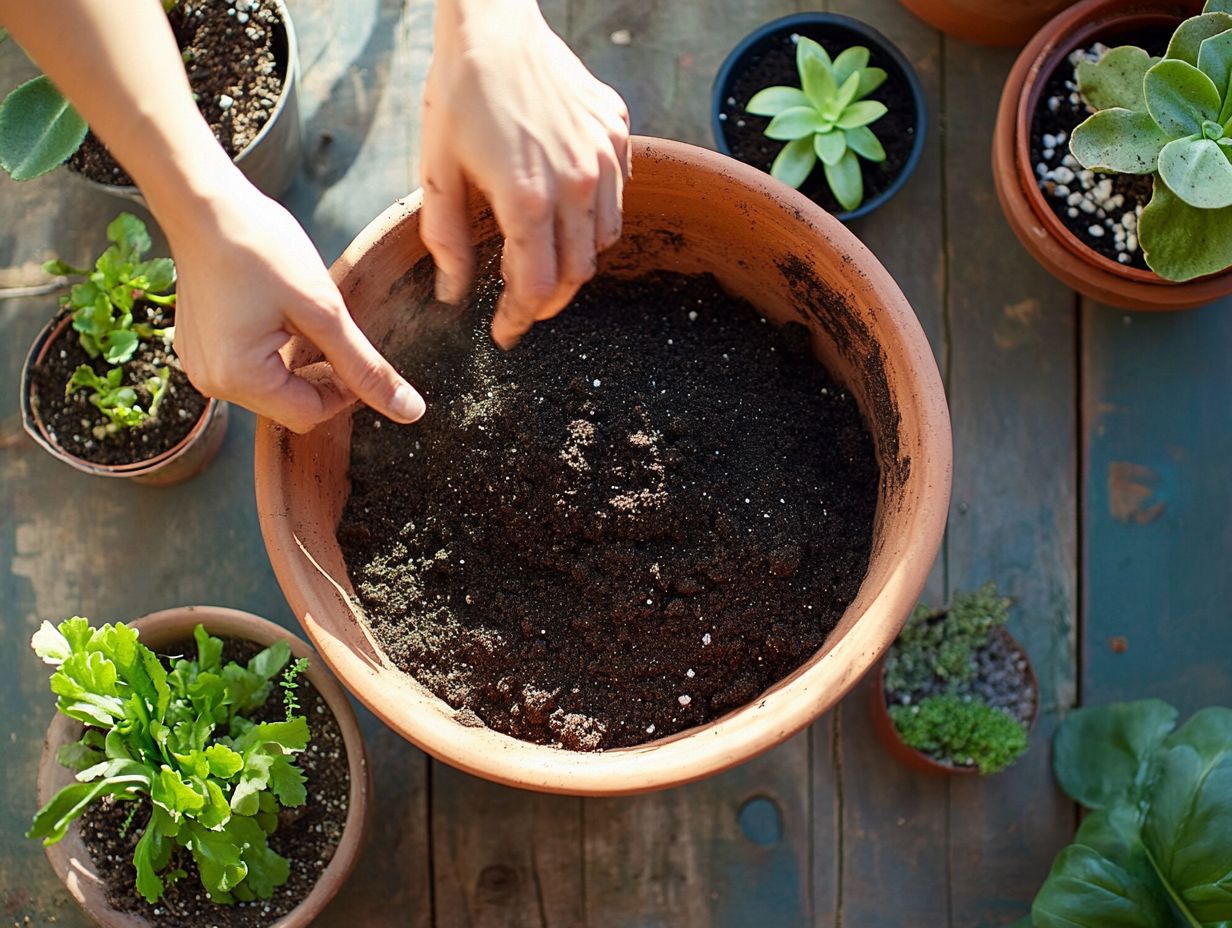
Organic amendments, such as compost and peat moss, enrich your soil with essential nutrients and enhance its structure. In contrast, inorganic amendments, including synthetic options, focus on improving drainage and aeration within the soil medium.
The distinction between these two types of amendments impacts pH levels and moisture retention. For instance, organic amendments gradually release nutrients and can help lower soil pH, which is particularly beneficial for acid-loving houseplants like azaleas. On the other hand, inorganic options may raise pH levels, making them ideal for the alkaline conditions preferred by certain succulents. To gain a deeper understanding of this topic, refer to our guide on understanding soil pH for indoor plants.
While organic amendments excel at enhancing moisture retention and supporting beneficial microbial activity, inorganic varieties often promote drainage crucial for plants like orchids that thrive in drier conditions. By understanding these nuances, you can make informed soil choices that promote optimal growth and health for your plants.
Don t wait! Improve your indoor garden today with the right soil amendments.
Common Types of Amendments
Some of the most common soil amendments at your disposal include perlite, vermiculite, wood chips, and peat moss. Each offers distinct benefits that can significantly elevate the growing environment for your houseplants.
These amendments play a crucial role in enhancing drainage and aeration. They also influence water retention and nutrient availability in the soil. Take perlite, for example this lightweight volcanic glass not only boosts aeration and drainage but also makes it the perfect companion for moisture-sensitive plants like succulents.
On the other hand, vermiculite excels at retaining moisture, making it an excellent choice for plants that thrive in consistently damp conditions, such as ferns. Wood chips contribute organic matter, improve soil structure, and bolster beneficial microbial activity. Meanwhile, peat moss works wonders for moisture retention.
By understanding the specific needs of your houseplants, you can make informed decisions about amendments. For instance, blending equal parts of peat moss and perlite can create an ideal mix for aroids, fostering robust root growth. Additionally, learning how to fertilize your indoor plants effectively can further enhance their health.
Choosing the Right Amendment for Your Indoor Plants
Selecting the ideal soil amendment for your indoor plants requires a keen understanding of several essential factors. You ll want to consider the specific needs of your plants, assess the current condition of the soil, and clarify your overall objectives for their health and growth.
This comprehensive approach enables you to craft a customized potting mix that truly maximizes the potential of your beloved greenery.
Factors to Consider
When selecting soil amendments, it s crucial to consider the specific needs of your plants and the existing conditions of your soil. Pay attention to the balance of drainage and nutrients necessary for optimal growth.
To begin evaluating plant health, take a moment to observe the leaves, stems, and overall vigor of your plants. Any signs of nutrient deficiency or stress should signal a need for targeted amendments.
Assessing the physical properties of your soil its texture and structure is essential for determining which additions will be most beneficial. Balancing moisture levels is key; your plants require sufficient water without the risk of root rot. This can be effectively managed through various amendments that enhance drainage.
Air circulation is vital because compacted soil can hinder root development. Conducting soil tests for pH and nutrient content can offer invaluable insights. This allows you to implement tailored amendments that directly address any deficiencies, ultimately fostering a thriving garden environment.
Applying Soil Amendments
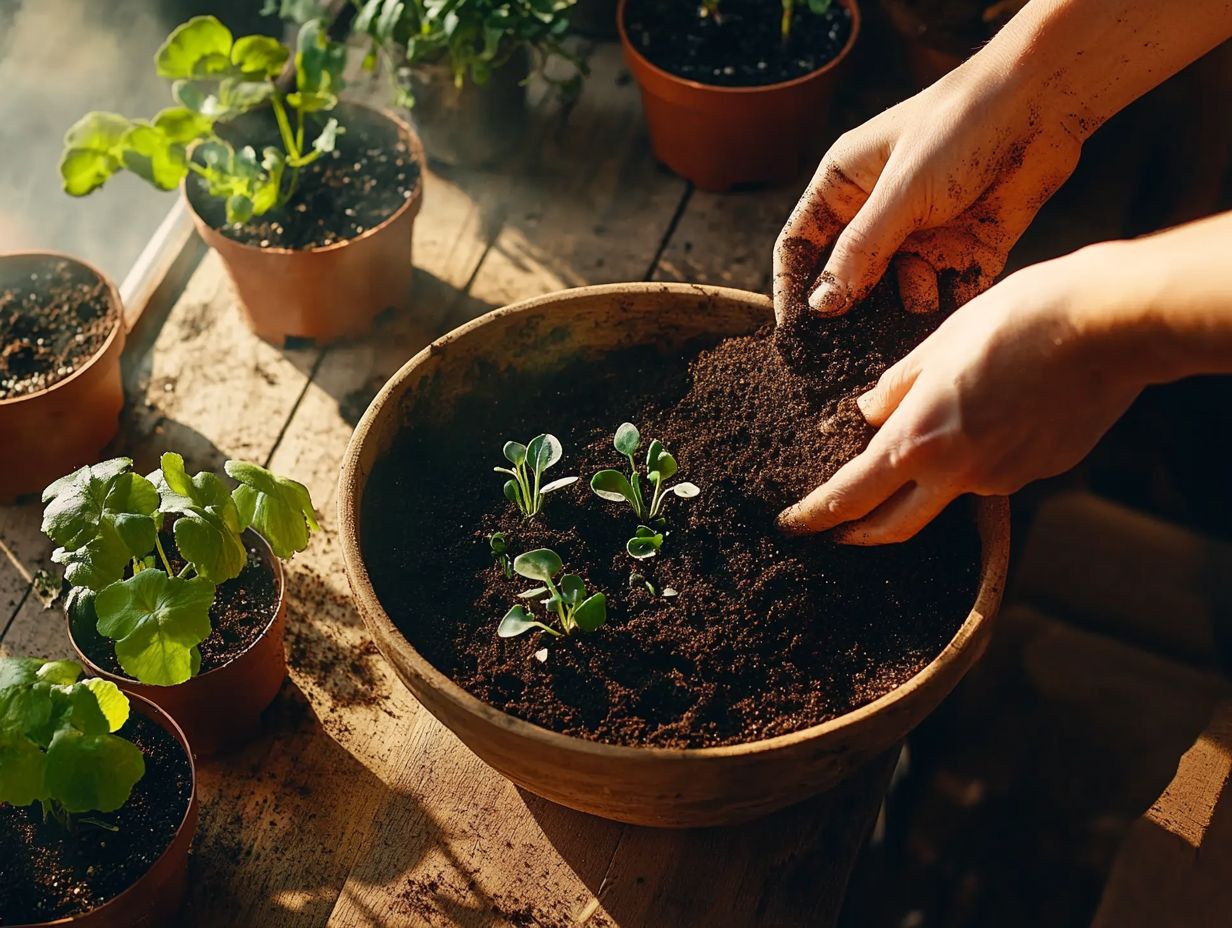
Act now to use the right techniques for amazing results! To apply soil amendments effectively, mix them in at the correct ratios. This will enhance the soil properties and support the health and growth of your houseplants during repotting and regular maintenance.
Proper Techniques and Tips
Using the right techniques when applying soil amendments can significantly boost their effectiveness. Carefully mix them into your potting soil and ensure even distribution to improve moisture retention and nutrient access.
It s important to explore various methods tailored to your indoor gardening needs. For example, layering amendments like compost or vermiculite at the base establishes a solid foundation for optimal root development.
Before and after introducing amendments, testing soil conditions will help you monitor pH levels and nutrient content effectively. Thoroughly mixing the amendments into the existing soil promotes uniformity and enhances water absorption.
By employing these practical strategies, you can cultivate healthier plants. This leads to vibrant greenery that thrives under your attentive care.
Maintaining Soil Health for Optimal Plant Growth
Maintaining soil health is crucial for achieving optimal plant growth. Regularly test soil conditions and strategically reapply amendments. This guarantees that your indoor plants receive the nutrients and moisture they require over time.
By taking these steps, you create a thriving environment that supports the long-term health and vitality of your plants.
Start transforming your indoor garden today with these simple amendments!
Regular Testing and Reapplication of Amendments
Regularly testing your soil is essential for grasping its health and nutrient levels. This knowledge gives you the power to determine the ideal timing for reapplying soil amendments, fostering the ongoing vitality of your plants.
You have a variety of testing methods at your disposal, ranging from simple DIY kits that let you take a hands-on approach to professional laboratory analyses that provide comprehensive insights. DIY methods often involve basic pH testing, which is a measure of how acidic or basic your soil is, and nutrient test kits available at local gardening stores. This gives you immediate feedback on your soil’s condition.
Hiring a professional service provides a detailed report that covers moisture retention, drainage capacity, and specific nutrient deficiencies.
With these results in hand, you can make informed decisions about the types and quantities of amendments needed. This ensures optimal conditions for your plants health and robust growth.
Frequently Asked Questions
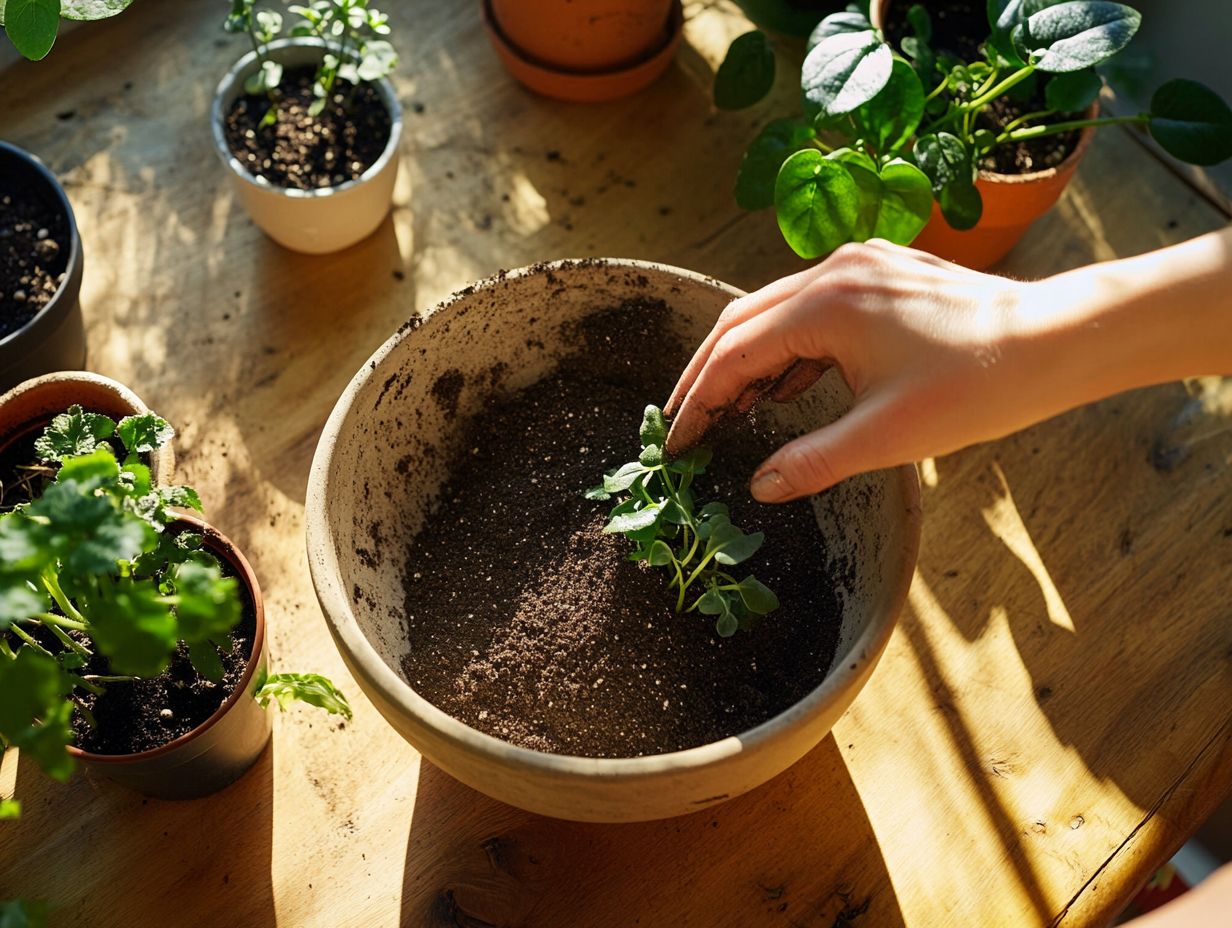
What is the importance of amending soil for indoor plant growth?
Amending soil for indoor plant growth can provide better aeration, drainage, and nutrient availability, leading to healthier and more productive plants.
How do I determine if my indoor plants need soil amendment?
Keep an eye on your plants! If they look sad or unhealthy, it s time for some soil love.
What types of amendments can I use for indoor plants?
Some common amendments for indoor plants include compost, peat moss, perlite, and vermiculite. You can also use specialized mixes such as cactus or orchid soil.
How often should I amend the soil for my indoor plants?
This will depend on the specific needs of your plants and the type of amendment used. Generally, it is recommended to amend the soil every 6-12 months or when repotting.
Can I use outdoor soil for my indoor plants?
No, outdoor soil is not suitable for indoor plants as it may contain pests and diseases and may not provide the proper balance of nutrients needed for indoor plant growth.
Is it necessary to amend the soil for all types of indoor plants?
It is not necessary for all types of indoor plants, but it can greatly benefit their growth and health. Research the specific needs of your plants to determine if soil amendment is recommended.

